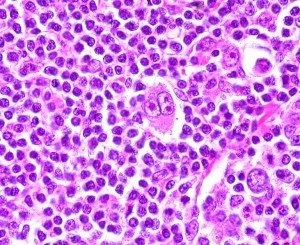FDA Approves Adcetris for Refractory Hodgkin’s Disease and a Rare T-Cell Lymphoma
Late Friday afternoon, the FDA announced its approval, upon accelerated review, of a new drug, Adcetris (brentuximab) for patients with Hodgkin’s lymphoma that has relapsed after bone marrow transplant and for some patients with T-cell anaplastic large cell lymphoma (ALCL).
This interests me for a lot of reasons, among them that I used to work in the field of lymphoma immunology and spent some time in my life studying molecules like CD30, the protein to which the new antibody binds.
First, a mini-primer on the disease and numbers of patients involved:
Lymphomas are almost always tumors of lymphocytes, usually of T or B-cell type. In adults, around 80% of cases derive from malignant B lymphocytes; T-cell lymphomas form a varied minority. Approximately 66,000 people receive a diagnosis of non-Hodgkin’s lymphoma (NHL) every year in the U.S.; if a third of the 13,000 or so T-cell tumors are ALCL, there would be just over 4,000 cases of T-ALCL per year, of which only a fraction would require aggressive treatment (see below).
There are nearly 9,000 cases of Hodgkin’s lymphoma (a related condition, usually of B cells) each year in the U.S. Only a small fraction of the Hodgkin’s cases undergo bone marrow transplant and, of those, a smaller percent would relapse and need further treatment.
T-cell ALCL is a rare lymphoma subtype in which malignant T-lymphocytes express proteins including CD30, a complex signaling molecule of the TNF receptor protein family. Clinicians generally classify the disease based on whether it predominantly affects the skin, in which case it tends to be indolent, or if it affects internal organs like the bone marrow, liver and brain, in which case it tends to be aggressive and be unresponsive to standard chemo regimens like CHOP. The T-cell form of ALCL is unlikely to respond to Rituxan, a monoclonal antibody that binds to CD20 on B-cells.
Pathologists classify ALCL based on whether or not the malignant cells have a chromosomal translocation or subtler mutation involving the ALK (anaplastic lymphoma tyrosine kinase) gene. Presumably ALK (anaplastic lymphoma kinase inhibitors) are and will be tested in ALCL tumors with ALK mutations. Meanwhile, patients with ALK+ or ALK- variants seek better treatment options.
The new drug is a specially-designed monoclonal antibody that’s conjugated to a toxin. It binds a receptor, CD30, that’s found at the surface of activated T cells, normal and malignant, and on the most definitive Hodgkin’s lymphoma cells, aka Reed Sternberg cells.
As is the case for many cancer drugs, how Adcetris works is not perfectly clear. Prescribing information from the drug’s manufacturer, Seattle Genetics, says the antibody would be given every 3 weeks by intravenous infusion “until a maximum of 16 cycles, disease progression or unacceptable toxicity.”
The drug was developed by Seattle Genetics (Seagen.com) in collaboration with Millennium Pharmaceuticals, a pharma giant subsumed by Japan’s Takeda company. There’s a lot of money at stake.
Today Ed Silverman at Pharmalot reports on the price of the new drug:
…Seattle Genetics disclosed that the annual cost for Adcetris, which the FDA approved late last week to combat Hodgkin’s disease and another rare lymphoma, will cost $13,500 per dose. In clinical trials, patients received an average of eight infusions, which works out to $108,000 a year, which Xconomy reports was in line with several Wall Street estimates.
He wonders about the cost, and whether it’s justified. My view is that the drug’s use in T-cell ALCL seems reasonable because those patients have so few options. As for using it as a “salvage” drug in Hodgkin’s patients who’ve already undergone bone marrow transplant, a costly and toxic procedure, I’m less confident.
“Early clinical data suggest that patients who received Adcetris for Hodgkin lymphoma and systemic anaplastic lymphoma experienced a significant response to the therapy,” said Richard Pazdur, M.D., in the late-Friday press release. Dr. Padzur heads the FDA’s Office of Oncology Drug Products.
According to the press release, Adcetris was tried in a single-arm (non-randomized) trial of 58 patients with systemic ALCL. The tumors shrank partially or completely in 86 percent of patients. Their responses lasted 12.6 months on average. So far there’s been no demonstrated benefit in survival.
The data to support the drug’s use in Hodgkin’s patients after transplant come from a single-arm study of 102 patients who relapsed after autologous bone marrow transplantation. According to the FDA, 73 percent had a complete or partial response that lasted 6.7 months, on average, upon receiving the experimental drug. Again, there’s no demonstrated survival benefit, just a response rate reported by the agency.
There are over a dozen trials listed with ClinicalTrials.gov for Brentuximab Vedotoxin (SGN-35).
Meanwhile, we await FDA Commissioner Dr. Hamburg’s decision for Avastin in women with metastatic breast cancer.
—
Leave a Reply